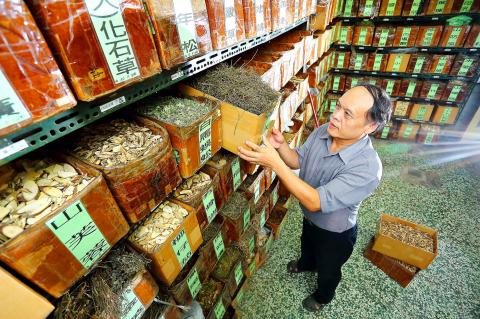When the scorching heat of a summer’s day gets too much to bear, you might want to cool down with a cup of herbal tea. This kind of drink, which has been passed down to us from our ancestors, remains a great choice for cooling off in the summer heat. However, the wares on sale in herb shops include not just herb teas made to various formulas, but also many kinds of freshly-picked or sun-dried herbs. But are they medicine or weeds? Lai Horng-liang, a professor in the Department of Plant Industry at National Pingtung University of Science and Technology, says: “Herbs in the broad sense include Chinese medicine and herbal medicine. Those that are recorded in classical materia medica such as The Divine Farmer’s Materia Medica and The Compendium of Materia Medica may be called Chinese medicine, while general folk or popular medicines can be called herbal medicines or medicinal herbs.”
Herbal medicine was used in all ancient countries, such as Egypt, India and China, especially before the invention and popularization of Western medicine. In those days, our ancestors mostly used medicinal herbs and certain animal-based medicines to treat illnesses. “Herb streets” are gathering places that came into existence to make it convenient for the general public to buy medicinal herbs. Kuo Kun-shan, proprietor of the Yuanshan Herb Shop, says: “In the past, our ancestors usually went up into the hills after dusk to gather herbs and then took them to popular commercial areas to sell. The herb street on Kaohsiung’s Hebei 2nd Road evolved in this way from the earlier Miaocheng street market.
Lai says: “For people who do not know about them, medicinal herbs just look like weeds, but in the eyes of those who know, they are treasures. One of the reasons why Taiwan’s medicinal herb trade is so developed is that we have abundant plant resources. Taiwan is located north and south of the Tropic of Cancer and has both tropical and subtropical plants. In addition, plants that grow in temperate and polar climates can be found high up in the mountains. Taiwan has a high density and diversity of plant species and consequently has many usable plant resources. Research indicates that Taiwan has more than 1,500 kinds of medicinal plant, and if plants that are unlisted but have potential medical applications are added, there are countless others. This is another reason why Taiwan has such a flourishing trade in medicinal herbs.”

Lee Hui-chou, Liberty Times
照片:自由時報記者李惠洲
(Liberty Times, translated by Julian Clegg)
炎炎夏日,忍不住會想來杯青草茶消暑退火,這款老祖宗流傳下來的「飲料」,至今仍是酷夏消暑盛品,但青草店內;賣的可不只有各家配方的青草茶,還有許多新鮮採摘或曬乾的各式「青草」。這些到底是藥還是草?國立屏東科技大學農園生產系教授賴宏亮說:「青草」廣義來說包含中藥與草藥,在《神農本草經》、《本草綱目》等歷代本草典籍中有記載的,可稱之為中藥,而一般的民俗或民間用藥則稱之為草藥,即俗稱的藥草。」
化學藥劑在較古老的國家如埃及、印度、中國等都有藥草的使用,尤其在西藥未發明和普及前,老祖宗多是使用藥草和少數的動物用藥來治療疾病,而「青草街」的形成,即是方便一般民眾;購買藥草的集散地。源山青草行老闆郭昆山說:「過去的前輩多在黃昏後至山區採藥,再運送至人多的市區販售,高雄河北二路青草街的形成,即是從早期的廟埕街市演變而來。」
賴宏亮說:「藥草在不認識的人看起來就是草,認識人的眼裡就是寶。台灣藥草之所以會如此發達,有一部分原因是有豐富的植物種類,台灣在北迴歸線的南北方,有熱帶和亞熱帶植物,加上高山有溫帶、寒帶植物,植物密度及多樣性高,故有很多可用的植物資源。據研究指出藥用植物高達一千五百多種,加上尚未列入但有潛力做為藥用植物者不計其數,也是藥草興盛的原因之一。」
(自由時報)

A: The 23rd Taiwan Pride parade will be marching again on Saturday, Oct. 25. B: Will the parade kick off from Taipei City Hall Plaza as usual? A: Yup, and there will be over 110 LGBT-themed booths at the Rainbow Festival in the plaza. B: The organizer is reportedly teaming up with Japanese, South Korean and other international groups. A: So we are likely to see more foreign visitors from across the world. Hopefully, this year’s parade can smash the record of 200,000 marchers set in 2019. A: 第 23 屆台灣同志遊行本週六即將登場。 B: 遊行還是從台北市政府前廣場出發嗎? A: 對,廣場「彩虹市集」還有超過

California will phase out certain ultra-processed foods from school meals over the next decade under a first-in-the-nation law signed on Oct. 8 by Gov. Gavin Newsom. The law seeks to define ultra-processed foods, the often super-tasty products typically full of sugar, salt and unhealthy fats. The legislation requires the state’s Department of Public Health to adopt rules by mid-2028 defining “ultra-processed foods of concern” and “restricted school foods.” Schools have to start phasing out those foods by July 2029, and districts will be barred from selling them for breakfast or lunch by July 2035. Vendors will be banned from providing the “foods

Have you ever bought a new smartphone and suddenly found yourself dissatisfied with your perfectly fine headphones? Before long, you’ve purchased premium wireless earbuds, a protective case and a fast-charging station. What begins as a single acquisition snowballs into a shopping spree—this is the Diderot effect in action. Named after the 18th-century French philosopher Denis Diderot, the Diderot effect originates from an essay he wrote. In it, he recounted receiving a luxurious robe as a gift. As lovely as it was, the robe clashed with the rest of his humble belongings. One by one, he replaced his possessions to match the

A: As the Taiwan Pride parade enters its 23rd year, the nation also celebrates the sixth anniversary of the legalization of same-sex marriage. B: However, a poll showed that support for same-sex marriage slightly dropped to 54.3 percent from last year’s 56.5 percent. A: The government is wavering on whether to extend the Assisted Reproduction Act to same-sex couples, leading to public doubts. B: Since US President Donald Trump took office in January, his oppression of Diversity, Equity and Inclusion (DEI) programs has also frustrated the global LGBT community. A: Let’s join the parade in Taipei tomorrow to